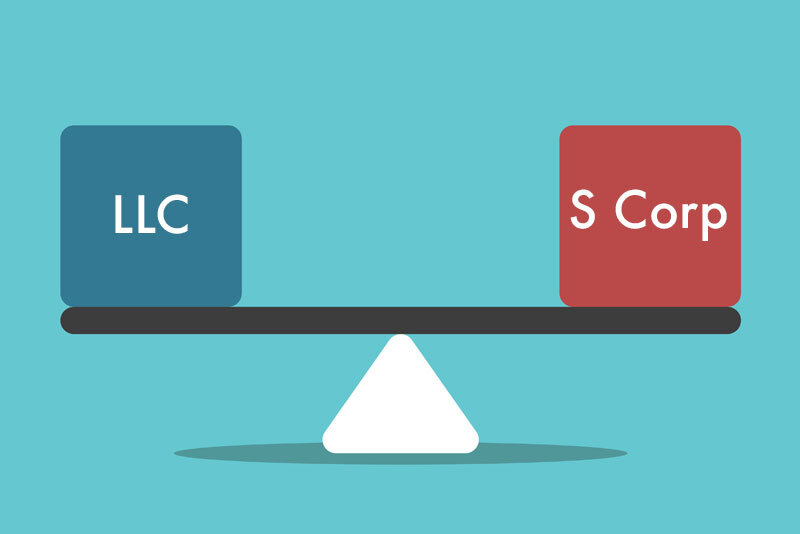Limited liability companies (LLCs) and S Corporations are business structures that provide liability protection for business owners and allow for pass-through tax treatment. While they have those things (and some others) in common, they differ in several ways, too. If you’re starting a business or considering changing from a Sole Proprietorship or General Partnership to an S Corporation or LLC, it’s critical to understand the similarities and differences. Every business and business owner’s needs are unique in some respects, so I encourage entrepreneurs to do research on their own and enlist the expertise of an attorney and tax advisor when deciding how to structure their company.
A Limited Liability Company is a statutory business entity that one or more business owners (called members) may form. Each state requires the filing of registration paperwork (usually called Articles of Organization) with the secretary of state (or comparable agency) office to establish an LLC.
S Corporation status is a tax election option that eligible LLCs (or Corporations) may choose. S Corporation election may be applied when forming the entity (or at a later time) by submitting the appropriate form to the IRS. For business compliance, an S Corporation must meet whatever requirements the underlying business entity must fulfill. In other words, an LLC that elects to be treated as an S Corporation must follow its state’s rules for LLC business compliance.
Considerations When Choosing an Entity Type
Ownership Eligibility
A Limited Liability Company can have one or more owners (members), including individuals, other LLCs, corporations, or foreign entities. Generally, states don’t restrict how many members an LLC may have. However, some states prohibit certain types of businesses (such as those in the insurance and banking industries) from forming an LLC. Also, some states do not allow licensed professionals (such as doctors, lawyers, accountants, and architects) to operate as LLCs. As an alternative for those types of professionals, states may allow the formation of an entity called a Professional Limited Liability Company (PLLC).
It’s crucial for an LLC to document its members’ percentage of ownership, roles, and responsibilities in a written LLC operating agreement.
The eligibility requirements to become an S Corporation shareholder are more restrictive than those for an LLC. To elect tax treatment as an S Corporation, an LLC must be a domestic company with owners who are individuals, certain trusts, or estates. Partnerships, Corporations, and non-resident aliens may not be S Corporation shareholders. Other restrictions on S Corporations include a maximum of 100 shareholders and the stipulation that the entity issue only one class of stock.
Liability Protection
Both the LLC and S Corporation protect business owners’ personal assets. They limit personal liability for the business’s debts or legal action against the company. As you may imagine, this provides some peace of mind as an individual’s home, cars, bank accounts, retirement savings, and investments are protected from the liabilities and risks of the business.
However, a court might rule that an LLC’s members or S Corporation shareholders are personally responsible for debts and legal issues of the business if they acted fraudulently, personally guaranteed business loans, or were negligent or reckless in some way that caused harm. Another way the Corporate veil of liability protection might be pierced is if the LLC doesn’t fulfill its business compliance obligations.
Business Owner Income
An LLC’s owners cannot be considered employees of their company. Therefore, they do not get compensated through company wages or salaries. To get paid by the business, LLC members take money from their share of the company’s profits.
- Single-Member LLC – The LLC owner withdraws money by taking an owner’s draw. Typically, this happens via the LLC owner writing themselves a check from the business bank account or otherwise transferring funds from the business to their personal bank account.
- Multi-Member LLC – When a member needs money, they draw funds from the LLC, which is accounted for in that individual’s capital account (a log of the member’s membership shares of the LLC and their financial activities). Usually, draws are executed via business checks written out to the members. Most states allow LLCs flexibility in dividing profits among their owners (e.g., according to ownership percentage or other criteria).
In some scenarios, LLC members may have alternate ways of getting paid for services they provide to the company. A knowledgeable tax advisor or accountant can shed some light on what options exist.
An S Corporation’s owners (also called shareholders) who do substantial work for the S Corporation are considered employees and must be on the company payroll. They then receive compensation from the S Corporation through wages or salaries. The company must complete payroll registration with the federal and state governments. It will be responsible for withholding and remitting FICA (income taxes, Social Security and Medicare taxes), FUTA (unemployment taxes), and possibly other taxes from those wages and salaries.
S Corporation shareholders may also receive income via distributions made when the company has profits to divide amongst its owners. Those distributions must be paid to shareholders in proportion to their ownership share.
Pass-Through Taxation Differences
By default, the IRS considers a Single-Member LLC a disregarded entity, and it is treated as a Sole Proprietorship for tax purposes, with all of the LLC’s profits and losses flowing through to the individual owner’s personal tax return. The IRS considers a Multi-Member LLC a Partnership. Therefore, a Multi-Member LLC must file an information return (Form 1065, U.S. Return of Partnership Income) with the IRS, although its income and expenses pass through to its members’ personal tax returns. An LLC’s profits are subject to income tax and self-employment taxes (Social Security and Medicare).
With S Corporation tax treatment, LLC members still have pass-through taxation. However, the owners only pay Social Security and Medicare taxes on their wages and salaries from the business. Income taken as distributions is not subject to self-employment taxes, so business owners may find that the S Corporation election reduces their personal tax liability.
A word of caution! Some S Corporation owners run into trouble because they try to game the system by paying themselves a meager salary and taking most of their compensation in distributions. Their attempts to minimize the amount of FICA and payroll taxes they must pay rarely go unnoticed by the IRS and Social Security Administration. The agencies watch S Corporations closely to look for red flags.
The moral of the story: Research what a reasonable salary is for S Corporation owners. The right amount will depend on the industry, the shareholders’ experience and expertise, the scope of everyone’s duties, and other factors.
Methods of Raising Capital
Both the LLC and S Corporation allow borrowing money and selling equity to raise capital to start and grow the business. An LLC can sell ownership interests in the company according to the provisions in its LLC operating agreement. An S Corporation may issue shares of stock to raise money—that is, until it reaches its 100 shareholder limit.
Ongoing Business Compliance Responsibilities
LLCs, including those electing S Corporation status, must fulfill the ongoing LLC business compliance tasks their states require. These may vary from state to state, but I’ve listed several common requirements below.
- File an Annual Report
- Maintain a registered agent
- File tax returns and pay taxes on time
- Hold an annual meeting and record minutes
Duration of the Business Entity
LLCs and S Corporations may live on in perpetuity. Unless business owners dissolve the entity (or the state administratively dissolves it), or there’s some provision in the operating agreement that calls for dissolution under specific circumstances, the company can survive even after its original owners are no longer a part of it.
Steps for Forming an LLC
Forming an LLC may vary depending on the state and other factors. Here are the tasks that typically must be completed:
- Conduct a business name search to check if the desired business name is available for use.
- Designate a registered agent.
- File Articles of Organization with the state.
- Create and keep an LLC Operating Agreement at the principal place of business.
- Obtain an EIN.
- File an Initial Report (if required).
- Publish notice of the LLC’s formation in a newspaper (if required).
- Apply for any required business licenses and permits.
- File a Beneficial Ownership Information Report
- Register for payroll taxes.
How to Elect S Corporation Status
S Corporation status may or may not be advantageous for an LLC and its owners. Generally, business owners who want to lower their Social Security and Medicare tax obligations without grappling with the extensive registration and compliance tasks of a C Corporation may find the S Corporation election for an underlying LLC attractive. And if LLC members foresee wanting someday to file taxes as a Partnership or Sole Proprietorship, converting from an S Corporation to an LLC is easier than changing from a C Corporation. Still, business owners must consider other factors. Determining whether the S Corporation route is ultimately best can be confusing. I recommend talking with an attorney and tax advisor to weigh the benefits of the S Corporation vs. LLC before deciding.
Business owners can choose an S Corporation election when they file their business registration paperwork or at some point after an LLC is established. To do so, they simply file IRS Form 2553 (Election by a Small Business Corporation).
Newly formed LLCs have two months and 15 days (75 days) from their date of formation to file for S Corporation election to be in effect for their first year of operation. Existing LLCs must file Form 2553 no more than two months and 15 days after the beginning of the tax year that the election is to go into effect. An LLC must file its IRS form 2553 with the IRS in a timely manner to ensure the S Corporation election is effective for that tax year.
Most statutory laws conform to the IRS requirements and specifications for an S Corporation. However, some states require a separate S Corporation filing at the state level if a business wants to be treated as an S Corporation for state income tax purposes.
Frequently Asked Questions
Can an LLC be a shareholder of an S Corporation?
No. Other business entities may not own an S Corporation. The IRS defines eligible shareholders as individuals (U.S. citizens or legal residents), certain trusts, or estates.
Can two unmarried people own shares of an S Corporation as joint tenants?
Unless individuals co-own stock as a married couple, they are considered separate shareholders.
If an LLC owner invests money but is not actively involved in the company’s daily operations, do they have to pay self-employment taxes on their profit distributions?
Generally, all of an LLC’s profits are subject to self-employment taxes (Social Security and Medicare), regardless of whether LLC members work in the business. However, if the LLC is taxed as an S Corporation, its owners (shareholders) pay Social Security and Medicare taxes (known as FICA in this case) on only their wages and salaries from the business. There’s also an entity called a Limited Partnership that has limited partners (who are financially invested but do not actively work in the business) and general partners (who actively work in the business). While general partners pay self-employment taxes on their income, limited partners do not.
Does an LLC taxed as an S Corporation have to hold board of directors meetings?
If an S Corporation’s underlying business entity is an LLC, its compliance formalities are those of an LLC, not a Corporation. So typically, an LLC taxed as an S Corp does not have to appoint a board of directors. However, if the LLC operating agreement requires LLC member meetings, the entity must hold them as specified. Business owners should discuss their compliance responsibilities with their attorneys and accountants to ensure they follow all applicable rules.
Does an LLC continue to provide personal liability protection for its members if it elects S Corporation tax treatment?
The LLC entity (regardless of S Corporation status) provides limited liability protection to its members (shareholders in the case of an S Corporation). Under most circumstances, the business owner will not be personally liable for legal and financial claims against the business entity beyond the amount they invested in the company. However, that protection may not apply if the member (or shareholder) commits fraud, causes harm intentionally or through personal negligence, or personally guarantees a business loan. It’s best to consult an attorney to discuss your situation and assess your risk.
What is the yearly cost for filing annual reports for LLCs and Corporations?
The filing requirements and fees vary by state.

Choosing a business structure can be a tough decision for the new business owner. CorpNet wants to make the process easier.
This free, online tool helps small business owners navigate the process of picking the right business structure for their new business.




